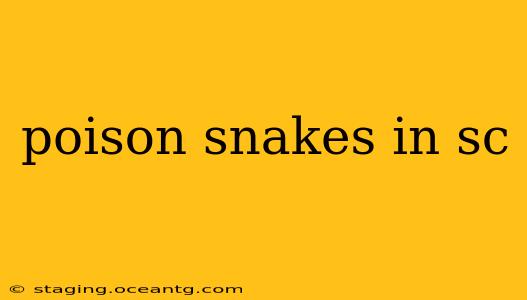South Carolina boasts a diverse ecosystem, and with it comes a variety of snake species, some of which are venomous. Understanding which snakes are dangerous and how to avoid encounters is crucial for safety, especially for outdoor enthusiasts and residents. This guide provides a comprehensive overview of poisonous snakes found in South Carolina, focusing on identification, behavior, and first aid measures.
What types of poisonous snakes live in South Carolina?
South Carolina is home to several venomous snake species, primarily belonging to the pit viper and elapid families. The most commonly encountered venomous snakes include:
-
Copperheads (Agkistrodon contortrix): These snakes are relatively common throughout the state and are easily identified by their distinctive copper-colored heads and hourglass-shaped markings along their bodies. They are generally shy and prefer to avoid confrontation, but will strike if threatened.
-
Cottonmouths (Agkistrodon piscivorus): Also known as water moccasins, cottonmouths are found near water sources, such as swamps, rivers, and lakes. They have a dark, almost black, body with a lighter-colored band around their mouth, which appears white when the snake is agitated. They are more aggressive than copperheads and are more likely to strike defensively.
-
Timber Rattlesnakes (Crotalus horridus): These large, heavy-bodied snakes are found in the mountainous regions of South Carolina. They are easily identifiable by their distinctive rattle at the end of their tail and dark brown or black crossbands on a tan or yellowish background. They are less common than copperheads and cottonmouths, but their venom is potent.
-
Pygmy Rattlesnakes (Sistrurus miliarius): Smaller than timber rattlesnakes, pygmy rattlesnakes are found in a variety of habitats, including sandy areas and pine forests. Their rattle is often difficult to hear, and they are sometimes mistaken for non-venomous snakes. Their venom is potent, however, and warrants caution.
What are the symptoms of a venomous snake bite in South Carolina?
Symptoms of a venomous snake bite can vary depending on the species of snake and the amount of venom injected. However, common symptoms include:
- Localized pain and swelling: This is often the first and most noticeable symptom.
- Redness and discoloration: The area around the bite may become red, purple, or blue.
- Nausea and vomiting: These symptoms are common, especially with more severe bites.
- Weakness and dizziness: A general feeling of unwellness can occur.
- Difficulty breathing: In severe cases, venom can affect the respiratory system.
- Bleeding disorders: Some venom can cause excessive bleeding.
It's crucial to seek immediate medical attention if you suspect a venomous snake bite. Do not attempt to treat the bite yourself.
How can I avoid snake bites in South Carolina?
Prevention is the best approach when it comes to venomous snake bites. Here are some practical tips to minimize your risk:
- Wear appropriate footwear: Boots or sturdy shoes will protect your feet from snake bites.
- Be cautious when walking in tall grass or brush: Use a stick to part the vegetation in front of you.
- Avoid reaching into holes or crevices: Snakes often seek shelter in these areas.
- Keep a safe distance from snakes: Do not attempt to approach or handle snakes.
- Be aware of your surroundings: Pay attention to where you are walking and look for signs of snakes, such as shed skin or tracks.
- Keep pets on a leash: Dogs and cats are more likely to be bitten by snakes than humans.
What first aid should I administer after a snake bite in South Carolina?
While professional medical help is the ultimate treatment, some basic first aid steps can be taken before reaching a hospital:
- Stay calm: Panic can worsen the situation.
- Keep the bitten area still and below heart level: This can help slow the spread of venom.
- Remove any jewelry or tight clothing: Swelling can occur rapidly.
- Clean the wound with soap and water: This will help prevent infection.
- Get to a hospital immediately: Time is critical in treating snake bites.
Do not:
- Attempt to suck out the venom: This is ineffective and can cause further injury.
- Apply a tourniquet: This can cut off blood supply and worsen the injury.
- Cut the wound: This can introduce infection.
- Try to catch or kill the snake: Focus on getting help.
This information is for educational purposes only and should not be considered a substitute for professional medical advice. Always seek immediate medical attention if you are bitten by a snake. The specific antivenom used will depend on the type of snake involved, which is why prompt identification and treatment are vital. Remember, respecting the natural habitat and exercising caution are the best defenses against snake bites in South Carolina.
